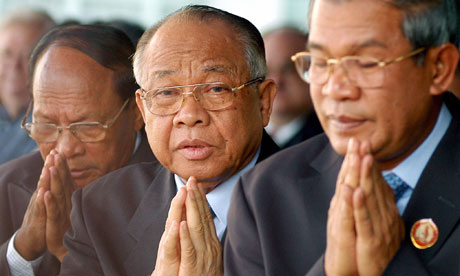Bradley Cox accuses authorities of blocking screenings of investigative documentary Who Killed Chea Vichea?

A documentary about the unsolved murder of an influential Cambodian trade-union leader who fought for increased wages and improved working conditions has been banned by the country's government, according to its director.
Bradley Cox, a US film-maker working in the south-east Asian state, said the authorities had blocked all screenings of his film Who Killed Chea Vichea? over the past month. The 55-minute piece, which had its European debut at the Cannes film festival last month, does not accuse the Cambodian government of orchestrating the killing of a figure who was linked to the opposition Sam Rainsy party, but does deal with the subject of corruption within the impoverished country of 14 million people.
Vichea, leader of the Free Trade Union of Workers of the Kingdom of Cambodia, was shot in the head and chest on the morning of 22 January 2004 as he waited at a newspaper stand in the capital, Phnom Penh. Cox was on the scene with a camera moments later and has been following the case ever since. Two men were tried for the murder and sentenced to 20 years each in prison, but both were provisionally released by the Cambodian supreme court last year and the case remains unsolved.
Cambodia is in theory a multi-party democracy under a constitutional monarchy, but the ruling Cambodian People's party has been accused by human rights groups and opposition lawyers of abusing its parliamentary majority to push through laws that limit freedom of expression.
"This is what governments do when they don't want their own people to know the facts and when they can't afford to show weakness, even for an instant," Rich Garella, one of the producers on the film and a former managing editor of The Cambodia Daily, told Reuters. Cox said: "I would encourage Cambodian government officials to practice what they preach."
Last month trade unionists attempted to screen the film at the very spot where Vichea was murdered, but riot police arrived swiftly to dismantle and seize the screens.
The Cambodian information minister, Khieu Kanharith, told Reuters that the documentary might have been banned "because it intends to accuse the government of murder". The authorities have reportedly labelled the film an illegal import and vowed to prevent screenings "wherever they are held".
Vichea, leader of the Free Trade Union of Workers of the Kingdom of Cambodia, was shot in the head and chest on the morning of 22 January 2004 as he waited at a newspaper stand in the capital, Phnom Penh. Cox was on the scene with a camera moments later and has been following the case ever since. Two men were tried for the murder and sentenced to 20 years each in prison, but both were provisionally released by the Cambodian supreme court last year and the case remains unsolved.
Cambodia is in theory a multi-party democracy under a constitutional monarchy, but the ruling Cambodian People's party has been accused by human rights groups and opposition lawyers of abusing its parliamentary majority to push through laws that limit freedom of expression.
"This is what governments do when they don't want their own people to know the facts and when they can't afford to show weakness, even for an instant," Rich Garella, one of the producers on the film and a former managing editor of The Cambodia Daily, told Reuters. Cox said: "I would encourage Cambodian government officials to practice what they preach."
Last month trade unionists attempted to screen the film at the very spot where Vichea was murdered, but riot police arrived swiftly to dismantle and seize the screens.
The Cambodian information minister, Khieu Kanharith, told Reuters that the documentary might have been banned "because it intends to accuse the government of murder". The authorities have reportedly labelled the film an illegal import and vowed to prevent screenings "wherever they are held".

2 comments:
Three dumb monkeys
There are wholes in their brains.
Post a Comment